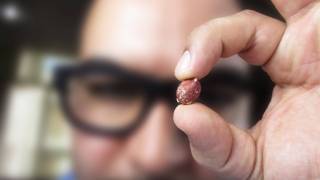Peanut Allergy Treatment Concerns Identified

France-based DBV Technologies announced that the U.S. Food and Drug Administration (FDA) has issued a Complete Response Letter regarding the Company’s Biologics License Application (BLA) for investigational Viaskin™ Peanut (DBV712). Viaskin is a non-invasive, once-daily epicutaneous patch to treat peanut allergies in children between the ages of 4 to 11 years.
The FDA did not raise any safety concerns related to Viaskin Peanut, which is an investigational proprietary technology platform with broad potential applications in immunotherapy.
The Complete Response Letter on August 4, 2020, indicates that ‘the FDA cannot approve the application in its present form. The FDA has identified concerns regarding the impact of patch-site adhesion on efficacy and indicated the need for patch modifications, and subsequently a new human factor study.’
‘The FDA has also indicated that supplementary clinical data would need to be generated to support the modified patch.’
In addition, the FDA requested additional Chemistry, Manufacturing, and Controls data. DBV intends to request a meeting with FDA to discuss the FDA’s comments as well as requirements for additional clinical data that may be needed to support BLA resubmission.
“We are very disappointed in the FDA’s response, but continue to believe in the potential of Viaskin Peanut. Peanut allergy is one of the most common food allergies, and accidental exposure can result in life-threatening reactions,” Daniel Tassé, Chief Executive Officer of DBV Technologies, stated in a press statement.
“We remain dedicated in our mission to develop innovative treatments for patients with food allergies.”
Previously, on July 7, 2020, DBV announced that The Journal of Allergy and Clinical Immunology has published results from its 3-year, open-label extension of the Phase III PEPITES study (PEOPLE).
The patients in the PEOPLE study demonstrated durable, long-term clinical benefit with an additional 2-years of treatment with Viaskin, with low discontinuations due to adverse events.
Viaskin is based on epicutaneous immunotherapy, or EPIT™, DBV’s method of delivering biologically active compounds to the immune system through intact skin.
If approved, DBV712 would be the first once-daily, non-invasive epicutaneous treatment option for children living with peanut allergy.
On January 31, 2020, Aimmune Therapeutics announced Palforzia was approved for peanut allergy treatment in the USA. Palforzia was approved for use in patients with a confirmed diagnosis of peanut allergy and in conjunction with a peanut-avoidant diet.
Moreover, the FDA said in a press release that ‘those who take Palforzia must continue to avoid peanuts in their diets.’
Palforzia is a therapeutic treatment, not a preventive vaccine for peanut allergies.
During December 2019, researchers from the University of South Australia (UniSA) announced they had developed a novel peanut allergy vaccine candidate formulated by packaging bits of peanut proteins into the Sementis Copenhagen-vectored (SCV) virus platform.
Dr. Preethi Eldi said in a related press release, ‘The peanut allergy vaccine tricks the immune system into seeing peanut allergens in a new light so that the body responds normally instead of generating an allergic reaction.’
This is important news since peanut allergies occur when the immune system mistakenly identifies peanuts as an allergen signaling human immune cells to release chemicals resulting in adverse reactions.
These severe allergic reactions can include impaired breathing, swelling in the throat, a sudden drop in blood pressure, dizziness, and even death, says the Centers for Disease Control and Prevention (CDC).
More than 170 foods have been reported to cause allergic reactions.
In the USA, peanut allergy has become the leading cause of anaphylaxis and death related to food allergy. The prevalence of peanut allergy was more than 2 percent of US children in 2010.
Avoiding a ‘peanut allergen’ is the only way to currently manage the allergy, said the CDC on May 29, 2019.
PrecisionVaccinations publishes peanut allergy vaccine and treatment news.
Our Trust Standards: Medical Advisory Committee







